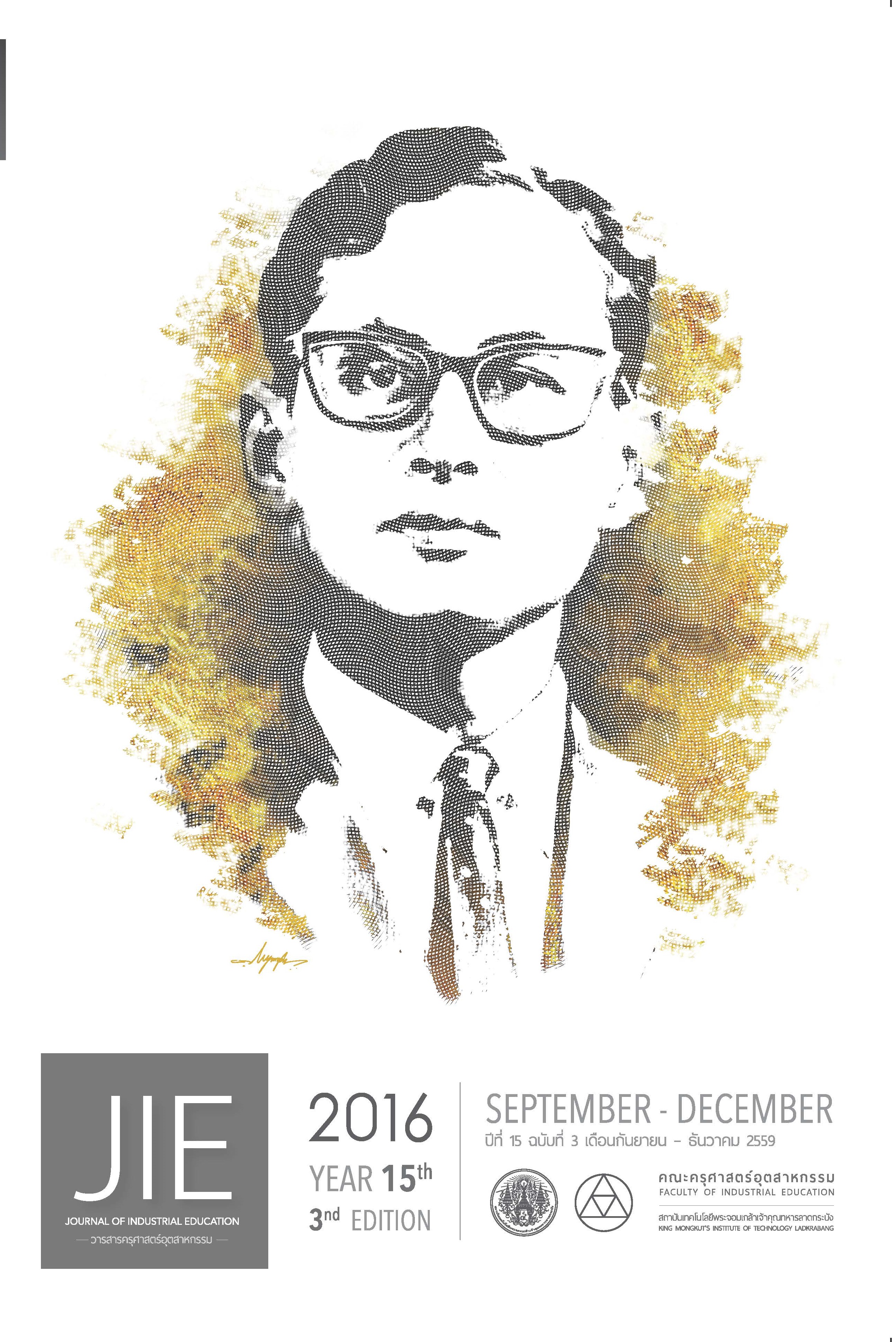A DEVELOPMENT OF SOCIAL RESPONSIBILITY INDICATORS ON ETHICAL RESPONSIBILITIES OF UNDERGRADUATE STUDENTS IN KING MONGKUT’S INSTITUTE OF TECHNOLOGY
Keywords:
indicator, social responsibility, ethical, undergraduate student, King Mongkut’s TechnologyAbstract
The purposes of the research were to study the development of social responsibility indicators on ethical responsibilities of undergraduate students in King Mongkut’s Institute of Technology and then to test the consistency of the measurement model on social responsibility indicators. The research procedures were divided into 2 steps. Step 1 : Setting the development of indicators on ethical responsibilities by studying, analyzing, synthesizing the related literatures and in-depth interviewing 17 experts. Step 2 : Testing the consistency of the measurement model on social responsibility indicators by using the questionnaire to collect data from undergraduate students at the number of 1,500. Data were analyzed by using the statistics as mean, standard deviation, and coefficient of correlation by statistical package and confirmatory factor analysis by LISREL program.
The research results were as follows:
- The indicators of social responsibility on ethical responsibilities of undergraduate students in King Mongkut’s Institute of Technology consisted to 4 views :1) benefit view consisted with 40 indicators, 2) individual view consisted with 35 indicators, 3) moral view consisted with 37 indicators and 4) fairly view consisted with 38 indicators.
- The measurement model on social responsibility indicators of undergraduate student in King Mongkut’s Institute of Technology was related to the empirical data at .05 significantly.
References
[2] สำนักงานคณะกรรมการการอุดมศึกษา. 2552. มหาวิทยาลัยกับความรับผิดชอบต่อสังคม (University social responsibility: USR.ค้นเมื่อ 4 มีนาคม 2558, จากhttps://www.mua.go.th/data_pr/data_sumate_52/Retreat_4.pdf
[3] Hair, Joseph F; et al. (2010). Multivariate Data Analysis :A Global Perspective. 7th ed.Upper Saddle River: Pearson.
[4] อนุพงษ์ วิบูลศิริชัย. 2554. ปัจจัยที่มีอิทธิพลต่อการรับรู้และเจตคติของผู้บริโภคในกรุงเทพมหานครเกี่ยวกับความรับผิดชอบต่อสังคมของอุตสาหกรรมอาหารและเครื่องดื่มในประเทศไทย. วารสารครุศาสตร์อุตสาหกรรม. 11(1), น.8 -13.
[5] Carroll, A. B., 1991. The Pyramid of Corporate Social Responsibility: Toward the Moral Management of Organizational Stakeholders. Business Horizons, 34(4),P.39 48. Retrieved March 28 2015. Available from: Business Source Complete.
[6] จุฑาทิพย์ ธีรภาค. 2529. วิเคราะห์จริยธรรมในหนังสืออ่านนอกเวลาระดับมัธยมศึกษาตอนปลาย. ปริญญานิพนธ์การศึกษามหาบัณฑิต สาขาการมัธยมศึกษา กรุงเทพฯ: บัณฑิตวิทยาลัย มหาวิทยาลัยศรีนครินทรวิโรฒ.
[7] ยุทธนา วรุณปิติกุล. 2542. สำนึกพลเมือง: ความเรียงว่าด้วยประชาชนบนเส้นทางประชาคม. กรุงเทพฯ: มูลนิธิการเรียนรู้และพัฒนาประชาสังคม.
[8] กระทรวงศึกษาธิการ. 2553. แนวทางการพัฒนา การวัดและประเมินคุณลักษณะอันพึงประสงค์ ตามหลักสูตรแกนกลางการศึกษาขั้นพื้นฐาน พุทธศักราช 2551. กรุงเทพฯ: โรงพิมพ์ชุมนุมสหกรณ์การเกษตรแห่งประเทศไทย จำกัด.
[9] McAlister. D. T. & Ferrell L., 2002.The Role of Strategic Philanthropy in Marketing Strategy. European Journal of Marketing 36(5/6), P.689-705.
[10] Brubacher. J. W.; Case. C. W & Rogan. T. G.(1994). Becoming Reflective Educator: How to build Culture of Inquiry in the Schools. New York: Mc Grar-Hill.
[11] ศิริพร สอาดล้วน. 2551. ความสัมพันธ์ระหว่างความมีวินัยในตนเองกับผลสัมฤทธิ์ทางการเรียนของนักเรียนชั้นมัธยมศึกษาปีที่ 3 โรงเรียนสาธิตมหาวิทยาลัยเชียงใหม่. วิทยานิพนธ์ศึกษาศาสตรมหาบัณฑิต
บัณฑิตวิทยาลัย มหาวิทยาลัยเชียงใหม่.
[12] Schermerhorn. 2011. Introduction to Management. (11th ed). Asia: John Wiley& Sons.
Downloads
Published
How to Cite
Issue
Section
License
"The opinions and contents including the words in papers are responsibility by the authors."
"ข้อคิดเห็น เนื้อหา รวมทั้งการใช้ภาษาในบทความถือเป็นความรับผิดชอบของผู้เขียน"



